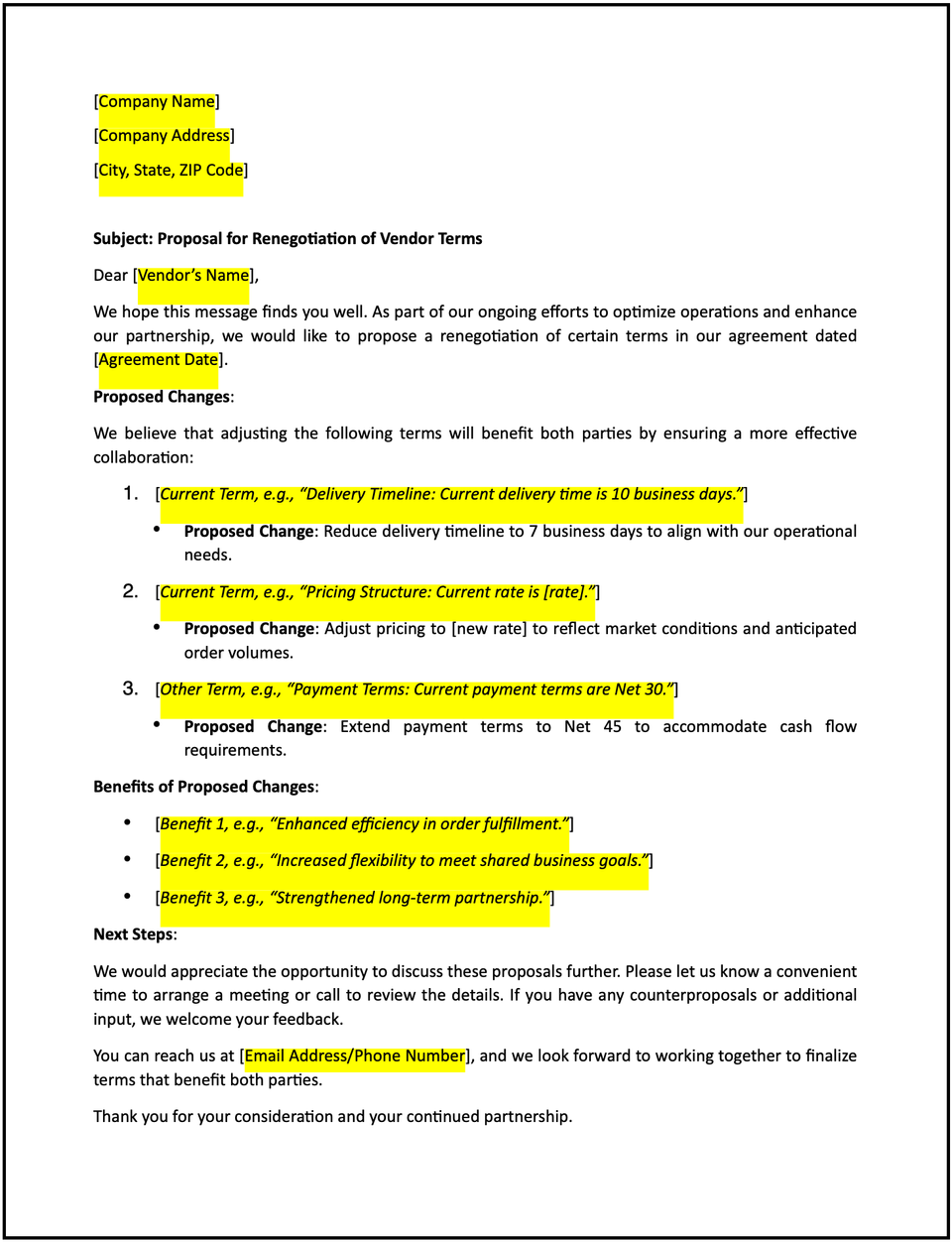Letter of proposal for renegotiation of vendor terms: Free template

Letter of proposal for renegotiation of vendor terms
A letter of proposal for renegotiation of vendor terms is a formal communication used to request adjustments to an existing agreement with a vendor. This letter outlines the reasons for the renegotiation, proposed changes, and the mutual benefits of revisiting the terms to ensure alignment with evolving business needs.
How to use this letter of proposal for renegotiation of vendor terms
- Open with an introduction: Address the vendor respectfully and reference the existing agreement or terms under discussion.
- State the purpose: Clearly communicate your intent to renegotiate the current terms and briefly explain the reasons for the request.
- Provide context: Outline the specific circumstances, such as market changes, budget constraints, or evolving business requirements, that necessitate the renegotiation.
- Highlight proposed changes: Specify the terms you wish to adjust, such as pricing, delivery schedules, or service levels, and explain their significance.
- Emphasize mutual benefits: Illustrate how the proposed adjustments support both parties’ objectives and sustain the partnership.
- Invite collaboration: Suggest a meeting or discussion to refine the proposed changes and address any concerns.
- Maintain a professional tone: Ensure the letter is clear, respectful, and focused on fostering a constructive dialogue.
- Provide contact information: Include details for the vendor to reach out with questions or to arrange a discussion.
Benefits of using a letter of proposal for renegotiation of vendor terms
This letter ensures a structured and professional way to address changing circumstances while fostering trust and collaboration. Here’s how it helps:
- Promotes alignment: Clearly outlining proposed changes ensures mutual understanding and agreement.
- Reflects professionalism: A well-crafted letter demonstrates respect and a commitment to maintaining the partnership.
- Encourages collaboration: Highlighting mutual benefits inspires openness to the renegotiation.
- Builds trust: Transparent communication fosters goodwill and strengthens the relationship.
- Supports adaptability: Revisiting terms ensures agreements remain relevant and effective.
Tips for writing an effective letter of proposal for renegotiation of vendor terms
- Be specific: Clearly describe the terms to be renegotiated and provide context for the request.
- Use professional language: Maintain a respectful and constructive tone to foster collaboration.
- Provide context: Briefly explain the circumstances driving the need for renegotiation.
- Highlight mutual benefits: Emphasize how the adjustments benefit both parties and ensure continuity of the partnership.
- Include actionable steps: Share instructions for scheduling a discussion or providing feedback on the proposal.
- Keep it concise: Focus on the essential points while ensuring the tone is professional and engaging.
Frequently asked questions (FAQs)
Q: What details should I include in this letter?
A: Include references to the existing agreement, reasons for renegotiation, and proposed changes.
Q: Should I personalize the letter?
A: Yes, addressing the vendor by name and referencing specific agreement details demonstrates attentiveness and professionalism.
Q: Who typically sends this letter?
A: Procurement teams, finance departments, or business owners typically send this letter.
Q: How formal should this letter be?
A: The tone should be professional, respectful, and focused on fostering collaboration.
Q: When should this letter be sent?
A: Send the letter when circumstances necessitate changes to the agreement, allowing ample time for discussion.
Q: Can this letter include alternative proposals?
A: Yes, offering multiple options demonstrates flexibility and openness to finding mutually beneficial solutions.
Q: Is acknowledgment from the recipient required?
A: While not mandatory, requesting acknowledgment ensures the vendor is considering the proposed changes.
This article contains general legal information and does not contain legal advice. Cobrief is not a law firm or a substitute for an attorney or law firm. The law is complex and changes often. For legal advice, please ask a lawyer.


